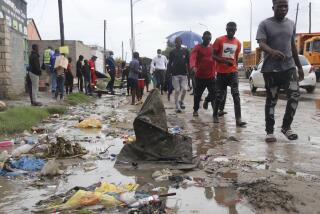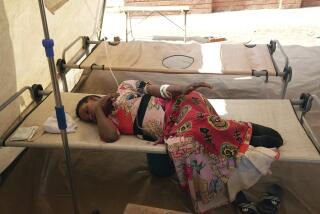WHO declares Ebola outbreak a global health emergency
- Share via
Reporting from Paris — The Ebola outbreak in West Africa is an international public health emergency that needs an extraordinary response to stop the disease from spreading further, the World Health Organization declared Friday.
Margaret Chan, head of the WHO, said the often-fatal disease was spreading in nations that did not have the resources to deal with it and called for “international solidarity,” though she acknowledged that many countries would probably not be hit by the outbreak.
The current wave of cases, which began in March, is the largest and longest in the history of the disease. The WHO issued similar emergency warnings for a swine flu outbreak in 2009 and for polio in May this year.
“Countries affected to date simply do not have the capacity to manage an outbreak of this size and complexity on their own. I urge the international community to provide this support on the most urgent basis possible,” Chan said at a news conference in Geneva.
Earlier this week, the WHO set up a committee of experts to establish the gravity of the Ebola outbreak, which began in Guinea and spread to neighboring Sierra Leone and Liberia.
The death toll is reported to have topped 900 people. Between Aug. 2 and Aug. 4, a total of 108 new cases as well as 45 deaths were reported from Guinea, Liberia, Sierra Leone and Nigeria, according to the WHO. The total number of cases stands at more than 1,700, with a fatality rate of about 50%.
Last week, Chan met with the presidents of the affected countries and launched a $100-million joint-response plan to bring the disease under control.
“Experiences in Africa over nearly four decades tell us clearly that, when well-managed, an Ebola outbreak can be stopped,” Chan said in a statement after the meeting.
In the United States, the Centers for Disease Control and Prevention raised its Ebola response Thursday to the highest level and recommended against travel to West Africa.
There is currently no licensed vaccine or treatment for the disease. Two American medical missionaries infected with the Ebola virus are being treated with experimental drugs after being flown to the U.S., and appear to be showing signs of improvement.
The WHO made several recommendations, including for countries not currently affected, but said there should be no “general ban on international travel or trade” to the affected nations. It added that the public should be given “accurate and relevant information” on the outbreak as well as measures they can take to reduce exposure to the disease.
“States should be prepared to facilitate the evacuation and repatriation of nationals (e.g., health workers) who have been exposed to Ebola,” the WHO said in a statement.
Willsher is a special correspondent.
More to Read
Sign up for Essential California
The most important California stories and recommendations in your inbox every morning.
You may occasionally receive promotional content from the Los Angeles Times.










